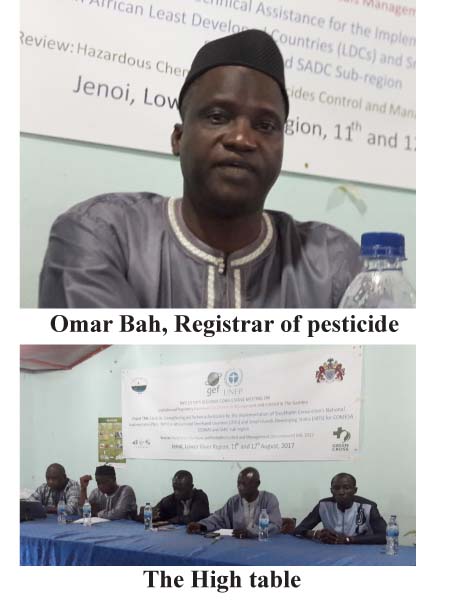
The
Government of The Gambia has shown full commitment to the protection of the
environment as a vital component of sustainable development and has
collaborated with developing partners such as GEF and UNEP in the
implementation of Stockholm, Basel and Rotterdam Conventions. These three
conventions aim to address chemicals management through cradle-to-grave
approach, mostly comprehensive in the case of Persistent Organic Pollutants
(POPs).
These
were the statements uttered by the Registrar of Pesticides and Hazardous
chemicals Omar Bah at a two-day consultative meeting on legislative and
regulatory framework for chemicals management and control in The Gambia that
recently took place at the Agricultural Training Centre in Jenoi, LRR.
The
meeting reviewed and incorporated comments, contributions and suggestions on
hazardous chemicals and Pesticides Control and Management (Amendment) Bill
2017.
The
Government of The Gambia is among 181 state parties that ratifies the Stockholm
Convention on Persistent Organic Pollutants (POPs) in June 2003, and according
to him, the ratification of and implementation of the Stockholm and other
relevant conventions represent an important step in solving the serious
environmental and health problems caused by hazardous chemicals. The Gambia is
predominant an agricultural country and depends heavily on pesticides and plant
growth regulators to enhance agricultural productivity, but has also recognized
the need and over the years has taken steps towards the development of an
institutional framework for the sound management of chemicals, he pointed out.
“The
Gambia does not manufacture chemicals, but we do import them. The fact that
most of our borders are porous makes the role of security officers very crucial
and important in the management and control of chemical and pesticide.
Chemicals and Pesticides, which are instinctive to our livelihood are use with
limited knowledge on its effect or use, therefore the inclusion of agricultural
and extension workers is also crucial in the training,” NEA`s registrar of
chemicals and Pesticides said.
As
chemicals are important determinants for sustainable development and their use
in agriculture, energy production sectors, raised concerns over their harmful
effects on workers, consumers, environment, etc. through exposures, wrong
disposals and accidental releases that may have permanent damage on the soil,
water and air.
Omar
Bah further revealed that The Gambia became a party Basel convention on the
Control of tans-boundary movements of Hazardous wastes and their disposal since
1997. The Rotterdam on the Prior Informed Consent (PIC) is based on the
principle of Prior Informed Consent that international shipment of chemicals
that are banned or of severely restricted to protect human health and
environment should not proceed from one point to another without the agreement
of both parties (Both the sender and receiver). The Gambia became a member to
this convention in 2004.
Describing
POPs as group of organic synthetic chemicals that are very persistent, very
toxic, bio-accumulative and travel very far within the Environment, Registrar
Bah warned that it can cause detrimental acute and long term effects to human
health, wildlife and the environment we live in.
The
Ratification of these conventions he said geared towards mitigating serious
health and environmental problems caused by hazardous chemicals, it recognized
the need to control and advocate for sound use of chemicals as inscribe in the
Strategic Approach for the Integration Chemical Management (SAICM) approach.
The
Pesticide and Hazardous chemicals control and management Act 1994 was developed
prior to the adoption of the Conventions and the Act has been in existence for
over two decades and during the period many chemical related issues that have
emerge during this time are not dealt with in its provisions.
Therefore,
according to Omar Bah, the need for it to be revised and updated is prudent in
other to strengthening our national legal capacity towards chemicals management
and control.
Lamin
Jaiteh, Laboratory Analyst and project coordinator, disclosed that pesticide
and hazardous chemicals control and management Act 1994 has been a reference
material for many countries and Sub regional bodies including CILLS due to its
comprehensive nature and therefore updating it will only add value and strength
to it.
“I
applauded the genuine efforts of donors and partners in the process of
reviewing the Pesticide and Hazardous Chemicals Control and Management Act
1994, and the legal consultant and team for their effort by doing justice to
the document. I therefore anticipated that the caliber of experts present here
today will put up a comprehensive scrutiny of the bill as a national document
and our collective effort to protect our health and the environment for future
generations, “he concluded.
Over
thirty-Five (35) Participants were drawn from North Bank, Central River, Upper
River and Lower River Regions took part in the cross-learning dialogue.



